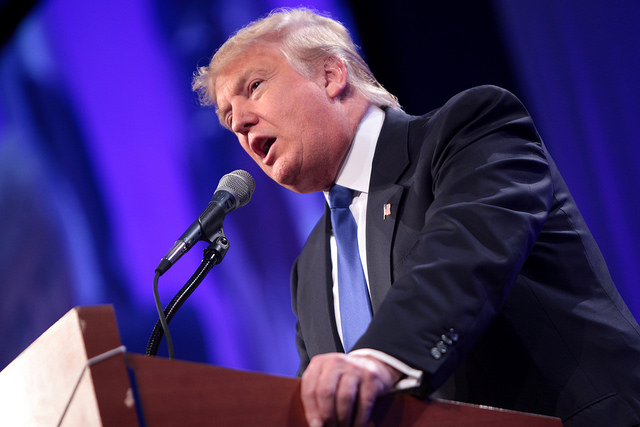Trump's Expansion of the Global Gag Rule Is the Largest to Date by Any President
By:
While every Republican President since Ronald Reagan has installed some version of the global gag rule—a policy that withholds American foreign aid money from organizations that provide abortion services—President Donald Trump's expansion of the policy is "impacts about 15 times more U.S. funding and also extends the reach of restrictions beyond NGO grants and cooperative agreements to contracts," according to the group PAI.
 Gage Skidmore - flickr.com
Gage Skidmore - flickr.com
What is the global gag rule?
The global gag rule was first put in place by Ronald Reagan in 1984. Because Reagan introduced the policy at thd International Conference on Population in Mexico City, it is also commonly known as the Mexico City Policy.
Essentially, the global gag rule withholds American foreign aid money from any organization that provides or even promotes abortion as a means of contraception. The policy can apply to organizations that so much as discuss abortion with their patients—hence the "global gag" name. Since Reagan initiated the policy, it has become a political football in the Executive Branch. Clinton revoked it, then Bush 43 reinstated it. Then Obama revoked it again. On January 23, just three days after stepping into office, Trump reinstated the policy. But he's gone one step further, promising to expand the reach of the global gag rule and further eliminate funding for healthcare providers in developing countries.
 JBrazito - flickr.com
JBrazito - flickr.com
Trump's expansion of the rule is unprecedented.
While previous administrations applied the rule only to a limited few types of foreign aid, the Trump administration is planning to vastly expand the types of money that can be withheld over abortion. According to the Guardian, "The new terms of the ban will apply to $8.8 [billion] in existing foreign aid provided by the State Department, USAID, and the Department of Defense – dwarfing the $600 [million] in programming that fell under the ban during previous administrations."
Trump is also giving the new policy a rebrand—dubbing it "Protecting Life in Global Health Assistance." But that title is a bit misleading, given that unsafe abortions kill tens of thousands of women every year.
Experts are concerned that the expansion of the rule could stymie the fights against AIDS and Zika.
Because the provision affects all healthcare providers who discuss abortion—not just restricting abortion services themselves, healthcare providers in developing nations face a difficult choice: stop offering and discussing abortion with patients, or forgo a major source of funding? If they attempt to go without funding, their ability to fight diseases completely unrelated to abortion could be severely compromised.
A statement released by PAI, a global health nonprofit, explains:
"While this may seem like just another anti-choice maneuver, it’s actually much more egregious. Trump’s Global Gag Rule applies not only to family planning programs, but to every program falling under the category of 'global health assistance.' It therefore targets the most effective health organizations in 60 low and middle-income countries which, without funding, will not be able to provide crucial health services. Among them are HIV prevention and treatment, maternal health care, provision of contraception and counsel for women on the potential risks of Zika infection."
The global gag rule also means the risk of an increase in unsafe abortions, according to the Global Fund for Women.
Unsafe abortions already account for nearly 13 percent of maternal deaths per year, according to the World Health Organization. WHO also reports that "21.6 million women experience an unsafe abortion worldwide each year; 18.5 million of these occur in developing countries" and around 47,000 women die per year due to an unsafe abortion.
What happened the last time the global gag rule (or Mexico City Policy) was in place.
A study done by Stanford University School of Medicine, published in 2011, looked at "the association between a country’s exposure to the Mexico City Policy and the odds of abortion among women of reproductive age between 1994 and 2008 using the reinstatement of the Mexico City Policy in 2001 as a natural experiment." The year 2001 marks when the policy was resuscitated by President George W. Bush.
The policy may not have reduced abortions in specific areas, according to results:
"Our study found robust empirical patterns suggesting that the Mexico City Policy is associated with increases in abortion rates in sub-Saharan African countries. Although we are unable to draw definitive conclusions about the underlying cause of this increase, the complex interrelationships between family planning services and abortion may be involved. In particular, if women consider abortion as a way to prevent unwanted births, then policies curtailing the activities of organizations that provide modern contraceptives may inadvertently lead to an increase in the abortion rate."
Following the initial reinstating of the global gag rule in January, Doctors Without Borders, or Medecins Sans Frontieres, released the following statement about the global gag rule and unsafe abortions, saying it will lead to more deaths (MSF, however, is not impacted by the cuts):
"The medical consequences of unsafe abortion are dire and should be treated as such," Jason Cone, MSF-USA's executive director, said in a statement in January. "Governments should not play politics with the lives of women and girls. No matter what the risk or barrier, women will continue to seek ways to end pregnancies and they will continue to needlessly die if safe abortion care is not accessible. The Trump Administration needs to face these facts and end policies that endanger the lives of women and girls."
